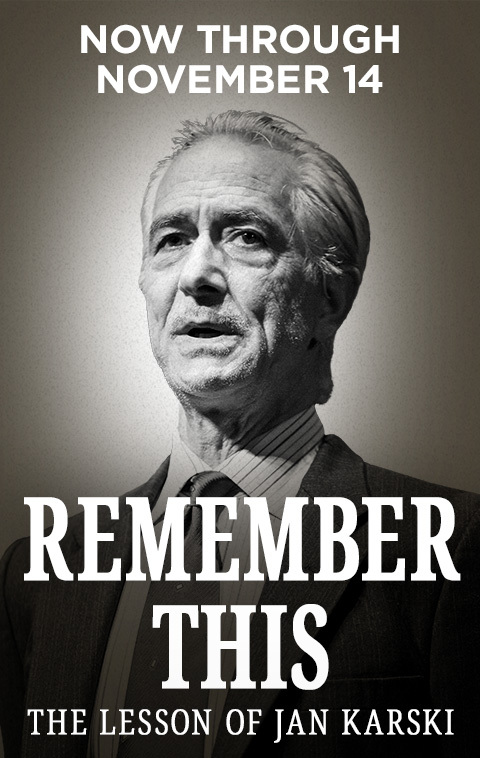
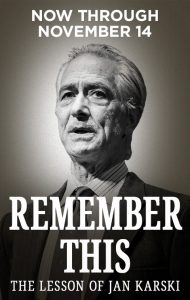 Highly Recommended! ***** Forceful, gripping, and indisputably exceptional, “Remember This: The Lesson of Jan Karski” is a superior piece of theatre. The legendary Emmy-award-winning David Strathairn enthralls us in this one-man show where he masters the character of Jan Karski, a conscientious Catholic man who refused to bow to Nazi and anti-Semitic tyranny in his native Poland. He was at various times a courier, diplomat, and statesman, who once relayed messages to Churchill and Roosevelt about the genocide of European Jewry during World War II—and was basically rebuffed and ignored. Strathairn’s marvelous depiction of Karski is topped only by the actor’s simultaneous portrayal of Karski’s contacts and acquaintances. Constantly changing his voice, his accent, his mannerisms, and even his costume, Strathairn metamorphizes into numerous characters as diverse as Polish resistance fighters, Nazi officers, teachers, nurses, well-known political figures, and the like. Yet Karski, the righteous gentile, always remains at the heart of the tale with all these characters radiating out of him. The presentation is engaging! The characterizations are dazzling! The acting is terrific!
Highly Recommended! ***** Forceful, gripping, and indisputably exceptional, “Remember This: The Lesson of Jan Karski” is a superior piece of theatre. The legendary Emmy-award-winning David Strathairn enthralls us in this one-man show where he masters the character of Jan Karski, a conscientious Catholic man who refused to bow to Nazi and anti-Semitic tyranny in his native Poland. He was at various times a courier, diplomat, and statesman, who once relayed messages to Churchill and Roosevelt about the genocide of European Jewry during World War II—and was basically rebuffed and ignored. Strathairn’s marvelous depiction of Karski is topped only by the actor’s simultaneous portrayal of Karski’s contacts and acquaintances. Constantly changing his voice, his accent, his mannerisms, and even his costume, Strathairn metamorphizes into numerous characters as diverse as Polish resistance fighters, Nazi officers, teachers, nurses, well-known political figures, and the like. Yet Karski, the righteous gentile, always remains at the heart of the tale with all these characters radiating out of him. The presentation is engaging! The characterizations are dazzling! The acting is terrific!
One cannot fully appreciate Karski’s life without first understanding the importance of its historical and political context. Unlike Claude Lanzmann, who compiled first-hand recorded accounts of the Holocaust for his five-part 1985 documentary series “Shoah”, this show takes a widely different turn. The script boils down the essence of that era’s crimes against humanity and projects it forward within a stirring and heartfelt on-stage performance. By narrowly focusing the narrative through the eyes of one character, we in the audience have the honor of watching the life of a remarkable yet humble man unfold before us. It is through his contacts as a partisan in the Polish resistance that he learns first-hand about the horrendous conditions within the Jewish ghetto of Lodz, a city with Poland’s second largest Jewish population. Armed with his moral compass that never deviates, he witnesses many aspects of the Holocaust and feels compelled “like a machine” to report on the evil that he sees, with the expectation that those in political power would do something meaningful to stop it immediately.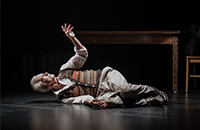
When Clark Young first took notice of the statue of Jan Karski on the Georgetown University campus, he wanted to learn more about the man who inspired it. In so doing, he teamed up with Derek Goldman, the chair of Georgetown University’s School of Performing Arts, and together they co-authored a powerful script that becomes the basis for this show. With Goldman also serving as the show’s director, the two skillfully share Karski’s life story with the world. But the play has a much larger ambition. It’s not just a specific recollection of past events but is constructed in such a way that we cannot help but ask ourselves how we, in the audience, might act in a similar situation. That was Young and Goldman’s goal when they created a production that is meant to engage a wide contemporary audience versus one solely comprised of elderly people who might have personally lived that history.
Above all, the lighting design by Zach Blane is phenomenal! His craftiness in providing illusions of battles and bombings plus other special effects cannot be beat! His imaginative use of lights and spectacle carries us through the tale, particularly in demarking shifts in time and space. Wow! Roc Lee’s original music and sound design–fantastically done—supports the changes in mood and lighting. This is combined with the use of theatrical fog to simulate wartime conflict and suggest memories of the past. The costumes by Ivana Stack consist of several outfits from the late 1930s-early 1940s vintage that can be mixed and matched to create distinctions between the various characters and indicate the progression (or regression) of time. This approach to costume design is simple, clever, and very effective!
Karski had once been a professor at Georgetown University’s School of Foreign Service, and this show could be viewed as a sneak peek into his international relations seminar, complete with his unique teaching style. And what was that style? Karski absorbs the various personalities that he encountered during his lifetime and reflects on them and mimics them, in much the same way that Strathairn later melds these into “flesh-and-blood” characters. Thus, we in the audience become Karski’s students in the master teacher’s 90-minute seminar/performance. The classroom context fittingly informs the minimal set design by Misha Kachman, consisting of a table with a drawer and two chairs and few props (mainly papers). The minimalist set also plays up on the statement that Karski says about himself: “I’m an insignificant little man.” Yet it is the dint of his personality and the intensity of his spirit that sets the stage aflame.
The word “lesson” in the title takes on many-meanings. Sitting in one of Karski’s seminars could be considered learning a lesson in history and international relations. As he once said, “There are no good or bad nations; just good or bad souls in these nations.” In addition, he leads by example. His life is a lesson in moral courage. The audience is thus confronted with a real-life individual who chooses to resist evil and stand up to dehumanizing and corrupting forces. Then too, the production as a whole is a lesson about how any one person—no matter how “insignificant” they may believe themselves to be—can fight back against hate, cruelty, and brutality, regardless of the circumstance. Finally, this is a story of “tikkun olam”, which in Hebrew means “repair of the world.” This is a concept in Judaism of working to overcome all forms of idolatry; and more specifically, it means behaving and acting in accordance with a sense of justice and morality to make the world a better place. This is not necessarily a matter of religion but of conscience. We see Karski through an imperfect mirror, and this inspires us to be our better selves and improve the world for the sake of other people, even those we don’t already know. Rather than being a historical account of World War II and the Holocaust, the show becomes a present-oriented call to action.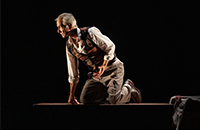
If there is any one production that you should see this fall, this is the one. Its brilliance and substance will make a lasting impression on you. As Karski remembers the events in his life, we also remember him. And through this theatrical reincarnation, his legacy lives on.
“Remember This: The Lesson of Jan Karski”, directed by Derek Goldman, is playing through November 14, 2021, at The Yard at the Chicago Shakespeare Theater, 800 E. Grand Avenue, on Navy Pier, in Chicago.
Tickets are $43–$75.
Sunday, November 7 at 7:45 p.m. (limited seating)
Tuesday through Saturday at 7:45 p.m.
Sunday, November 14 at 3:00 p.m.
Open Captioned performance: Thursday, November 11 at 7:45 p.m.
ASL Duo-Interpreter performance: Friday, November 12 at 7:45 p.m.
Audio description performance: Sunday, November 14 at 3:00 p.m.
For information on “Remember This” or to purchase tickets, go to: https://www.chicagoshakes.com/plays_and_events/rememberthis.
Run time is 90 minutes with no intermission. Following each performance, there will be a 20‑minute talkback with David Strathairn, Derek Goldman, and Clark Young.
For special access needs or additional assistance, please send a message through their Customer Service Portal anytime day or night at: https://www.chicagoshakes.com/about_us/contact_us/customer_service/portal
or call 312-595-5600 to reach the Box Office during regular business hours.
For general information about plays and events produced by the Chicago Shakespeare Theater, visit: https://www.chicagoshakes.com/.
Parking and directions can be found at: https://www.chicagoshakes.com/your_visit/parking_and_directions/.
COVID guidelines for the Chicago Shakespeare Theater:
All audience members (including children under the age of 12) must
—Show proof of Vaccination (or Negative COVID Test), either on a smartphone or a physical copy;
—Present a current Photo ID; and
—Wear a mask at all times.
For more details, go to: https://www.chicagoshakes.com/health.
You are invited to attend a panel discussion Monday, November 8 at 7:00 p.m. at the Illinois Holocaust Museum, in Skokie, with “Remember This” as the focal point. Panelists will reflect on how performance of memory and testimony can bring light to overlooked or forgotten histories, and how remembering creates new ways forward. Free to the public, but registration is required. For more information and to register, go to: https://www.ilholocaustmuseum.org/events/on-site-program-selections-from-chicago-shakespeare-theaters-remember-this-the-lesson-of-jan-karski-panel-discussion/.
To see what others are saying, visit www.theatreinchicago.com, go to Review Round-Up and click at “Remember This: The Lesson of Jan Karski”

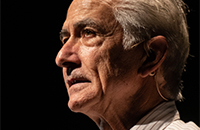





More Stories
“The Firebugs” reviewed by Julia W. Rath
“The Book of Grace” Al Bresloff with another from Paul LIsnek
“The Last Five Years” MILWAUKEE